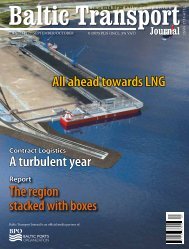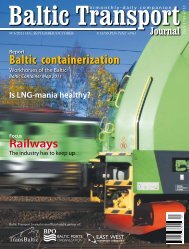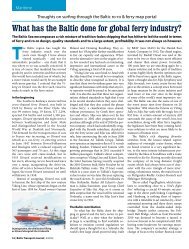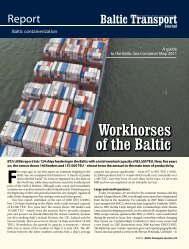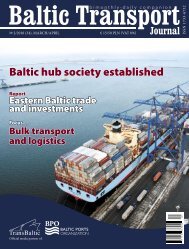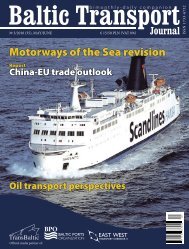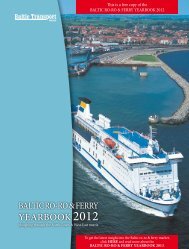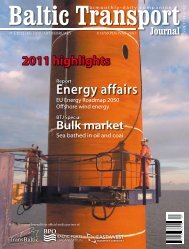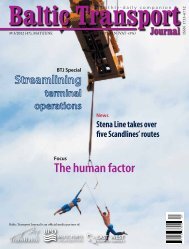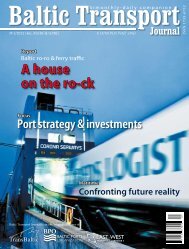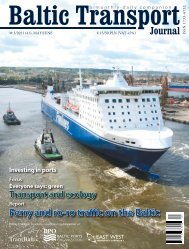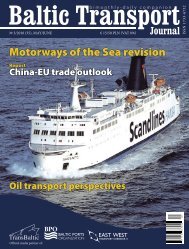You also want an ePaper? Increase the reach of your titles
YUMPU automatically turns print PDFs into web optimized ePapers that Google loves.
The Port of Gdańsk in search for non-standard development paths<br />
Why not a power plant?<br />
Photo: Port of Gdańsk Authority SA<br />
The Port of Gdańsk has always been the traditional transport route<br />
for the Polish mining industry<br />
As hundreds of thousands of tons of coal are transshipped in the<br />
port, why not combust it locally? The Port of Gdańsk Authority is<br />
analysing the construction of a power plant.<br />
According to some forecasts,<br />
electricity might be in short<br />
supply in the Gdańsk Pomeranian<br />
region within the<br />
next 10 years. This may slow<br />
down the economic development<br />
and in several years bring a déja vu of<br />
the communist times with dark streets and periodic<br />
blackouts in housing estates. Therefore,<br />
the construction of a new power plant seems a<br />
matter of urgency for the region.<br />
Fear of nuclear energy<br />
One of the proposed solutions is to return<br />
to the idea of a nuclear plant in the region,<br />
54 | <strong>Baltic</strong> <strong>Transport</strong> <strong>Journal</strong> | 3/<strong>2008</strong><br />
first time developed at the turn of the 1970s<br />
and whose construction started in the village<br />
of Żarnowiec 80 km north-west of Gdańsk.<br />
After the fall of communism the idea of the<br />
investment was rejected in a referendum. In<br />
Poland there were still vivid memories of the<br />
Soviet power plant catastrophe in Chernobyl,<br />
Ukraine, and the plant in Żarnowiec was to<br />
be constructed with the use of similar technology.<br />
And, even though there are many<br />
power plants in neighbouring countries, such<br />
as Germany, the Czech Republic, Slovakia,<br />
Ukraine and Lithuania, they are still viewed<br />
with a great deal of suspicion in Poland.<br />
Therefore, the recent announcement from the<br />
Polish government of a possible nuclear pow-<br />
er sector development has been received with<br />
concern, especially in Pomerania. Although<br />
the document entitled “Power Policy of Poland<br />
until 2030” does not give a specific site<br />
for a future plant, Żarnowiec has been mentioned<br />
unofficially as a good location.<br />
Opponents of the nuclear power energy<br />
are not convinced even though this time<br />
state-of-the-art and the safest know-how<br />
would be used, previously proven to work in<br />
many EU countries. Even this argument may<br />
be reversed and protested, as almost 100% of<br />
the technology, equipment and raw materials<br />
will have to be imported.<br />
The port is rich in coal<br />
An alternative idea has recently come<br />
up, namely a coal power plant in the Port<br />
of Gdańsk. Why at the Port? Because it is<br />
the traditional transport route for the Polish<br />
mining industry.<br />
Following the initiative of the Port of<br />
Gdańsk Authority, a meeting was held in<br />
March with a team of experts appointed to<br />
prepare an initial analysis of the idea.<br />
According to the first premises the plant<br />
would produce a power of 1000-2000 MW. It<br />
has also been assumed that due to the crosslocal<br />
and cross-regional importance of the<br />
investment, it would require the cooperation<br />
of the port’s authorities with PGE SA (Polish<br />
power networks) and the government bodies<br />
at all levels. However, a technology has not yet<br />
been selected, and the issue has been left for<br />
further consultation.<br />
Nevertheless, the meeting provided a hierarchy<br />
of initial problems:<br />
– organizational, legal and the technical feasibility<br />
of connecting and distributing electricity<br />
throughout the Polish electrical networks;<br />
– determining the parity of acceptable gas and<br />
dust pollution, disposal of water into the<br />
Bay of Gdańsk and other options for managing<br />
solid waste;<br />
– analysis of possible investment financing<br />
with the use of EU support for so-called<br />
pure technologies;<br />
– conditions of transport and storage of carbon<br />
dioxide, obtaining the required support<br />
in anticipation of local opposition.<br />
In fact, as soon as the news of the<br />
planned power plant in the port spread, the



